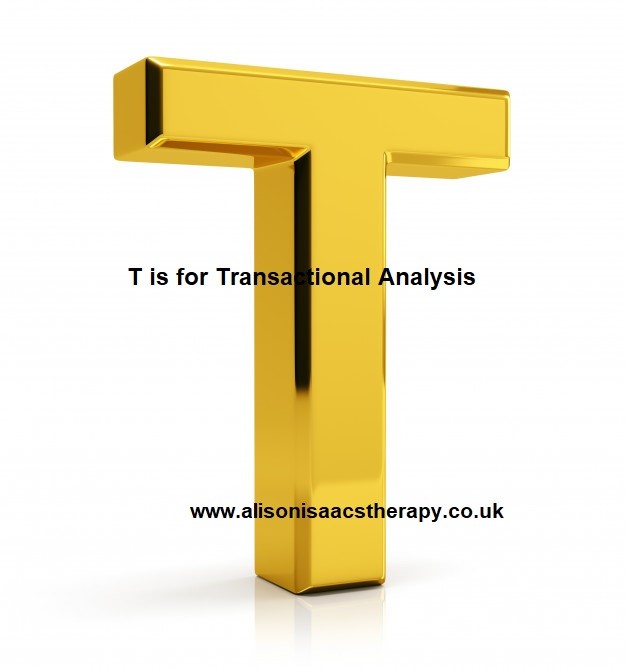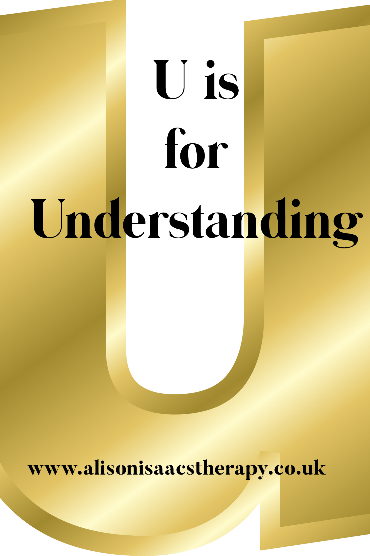These small snippets will give you a taster of some areas of therapy and mental health issues and here I share letters T – Z.

Transactional Analysis is the method for studying interactions between individuals and is a form of psychology founded by Eric Berne. It is based on the theory that each person has three ego-states: parent, adult and child. These are used along with other key transactional analysis concepts, tools and models to analyse how individuals communicate and to identify what interaction is needed for a better outcome.
Ego-states refer to the three major parts of an individual’s personality, and they each reflect an entire system of thought, feeling and behaviour.
These ego-states are:
Parent – Rooted in the past; a set of thoughts, feelings and behaviours learnt from our parents and other important people. This part of our personality can be supportive or critical.
Adult – Rooted in the present; relates to direct responses in the ‘here and now’ that are not influenced by our past. This tends to be the most rational part of our personality.
Child – Rooted in the past; a set of thoughts, feelings and behaviours learnt from our childhood. These can be free and natural or strongly adapted to parental influences.
Our ego-states determine how we express ourselves as individuals, interact with each other and form relationships. Designed to promote personal growth and change, transactional analysis offers the opportunity to develop all kinds of skills that can be applied to all areas of life. This makes the therapy valuable for helping to solve many types of problems.

Understanding or empathy is the ability to feel with clients as opposed to feeling for clients. It is the ability to understand feelings, thoughts, ideas, and experiences by viewing them from the client’s frame of reference.
We can go through life, never having felt very valued, heard, understood or accepted.
Others conditions, wishes, hopes, expectations can become muddled with our own. Our relationships don’t always work out with others as well as we may like them to. Even more importantly our relationship with ourselves. People who care for us may see us as a projection of their needs and problems and likewise we may do the same with others. In counselling it is therefore essential to offer something different in order that clients may realise and release their intrinsic worth. Central to this something different is value of empathy.
Empathic listening is at the heart of the counsellors developing sensitivity to the client and their inner world. Understanding involves both a perception of something implicit and explicit in the relationship and the ability to communicate this, through a reflective relationship and through checking the accuracy of our understanding.
Empathetic understanding helps clients to feel understood, fully heard and can enable you to process things in a different way.

Speaking aloud and verbalising your thoughts and emotions lets you see them from a new perspective, instead of just in the interior of your own mind. Counselling allows you to let things out that you’ve been keeping inside, purging you of pent up emotions. Many people find they are relieved of thoughts or feelings that they’ve been bottling up and such a release often feels like a weight off the mind and allows you to begin to let go of feelings you’ve been holding on to.
Having someone to talk to, who is there specifically to listen to you talk about your feelings, is an invaluable benefit to many people. Often people find solace in talking to friends or family, but for many people, this can actually be a barrier to openly and honestly discussing your issues. Many people feel more comfortable talking to a trained professional that can be offered through counselling services. The counsellor is essentially a stranger that will listen to you without judgement.
Clients come to the therapy room wanting to feel validated. Whether that is children/adolescents wanting to feel validation from their parents, teachers, or caseworkers or adults wanting to feel validated from their employers, spouses, or other family members. They want to feel comfortable sharing their feelings and opinions, but sometimes feel that it’s wrong or unsafe to do so.
To validate means to certify or confirm something. When someone feels that they are invalidated it means that they are wishing someone would accept what they’re doing or how they are feeling. To feel validated, one is acknowledged, feels as though they are important, and their purpose matters. A counsellor won’t ‘agree’ with their feelings, rather acknowledge that they see the client is feeling a particular way.
When someone feels invalidated, they feel a sense of being unimportant, without purpose and a feeling of emptiness. The feelings you experience, positive or negative, are there for a reason. Fear and anxiety may alert you to potential threats and help you respond accordingly. There are feelings that allow you to have meaningful social interactions and create emotional connections, like empathy, compassion, and understanding. When people experience invalidation they are confused about their feelings and learn to distrust their own emotions and that can affect long term mental health and future relationships.

Over a maximum of 2 hours, my short relaxation workshops will teach practical ways to relax and manage stress and anxiety in everyday life. The techniques will help you to:
- Reduce your stress using breathing techniques
- Ease aches and pains by learning to relax your muscles
- Manage you worries by freeing your mind from racing thoughts
Over 4 weeks for a maximum of 2 hours each week, my anxiety recovery workshops will teach you the skills and techniques needed to manage your anxiety and focus more positively. Benefits to these workshops are:
- Being around like-minded people with similar stories or experiences to you
- Having certain times each week to focus on your recovery
- Being able to ask me any questions you may have during or after the workshop
The groups are presentation-based, so there will be opportunities for discussion, but no pressure to share your personal experiences and you will be given handouts at each session to personalize the skills to your journey.
Please contact me on 07805 934114 or at info@alisonisaacstherapy.co.uk for more details.


Sometimes we attempt to meet the needs of our family members, employers, children, friends, or society in general before meeting our own needs. Working to please and care for others often interferes with our self-care routine and can take a toll on our well-being.
Self-care is the act of caring for yourself and making a conscious effort to do things you enjoy and will benefit from, in order to improve mental and physical well-being. It’s about being aware of your own health, identifying your own needs and taking steps to meet them.
It sounds simple, looking after yourself. After all, don’t you do that every day? But self-care can be more than eating, drinking and having a social life. While keeping busy and socialising may work for some people, others may benefit from some much-needed alone time. Self-care really can be whatever you need it to be, but you need to listen to your body to really understand what it wants.
Here are some self-care tips for a healthier you!
• Eat well & drink plenty of water – eating a balanced, healthy diet and
limiting your caffeine and alcohol intake can help relieve anxiety and
will improve your general health.
• Get a good night’s sleep – sleep helps your body to fight back, can
relieve stress, improve your memory and your mood
• Unplug your phone, television & computer – switching off from social
media can improve your quality of life, stay focused and sleep better.
• Get active – lower your weight, improve your physical and mental
health by taking a walk in nature every day
• Spend time with friends – increase your self-esteem and relieve stress
by spending quality time with your friends

I finish the counselling alphabet with the word Zest.
A zest for life means that we live each day with a sense of excitement. We take action and change things rather than complaining. We look at the positive side of life and move forward despite the challenges we face.
Zest is among the 24 character strengths that positive psychologists have defined and studied as keys to living a happy and fulfilling life. It is defined as “a sense of expectation, intuition, hope, energy and excitement.” The dictionary says that it’s gusto, liveliness or energy, the animating spirit.
In a wonderful post on enthusiasm, blogger and real-estate investor Matt Theriault lists the benefits of zest :
It makes life more fun. “It’s like an inner light,” Theriaul says, “an inner energy, and it really makes life easier.”
It’s attractive to people. “Enthusiasm is probably one of the most attractive qualities any person can have.”
It makes you want to do things, and then you get better results and fulfill more of the potential of any situation or experience.
It makes for powerful communication. It makes your message stronger.
It gets things done. “Enthusiasm is the switch.”
To finish here are some inspirational quotes for reflection:
“We can all be more than we are. Life is a process of improving oneself.” G. Mark Phillips
“Today is life – the only life you are sure of. Make the most of today. Get interested in something. Shake yourself awake. Develop a hobby. Let the winds of enthusiasm sweep through you. Live today with gusto.” Dale Carnegie
“Changing your mindset may change the situation.” Lisa Rusczyk
Alison Isaacs is an NCS accredited counsellor and clinical hypnotherapist working from her therapy room in Basingstoke.
At Alison Isaacs Therapy I offer short term and open ended counselling for most difficulties but really enjoy working with anxiety, stress, depression and low self-esteem.
If you have any questions or are ready to take the next step towards your counselling journey please contact me now.

